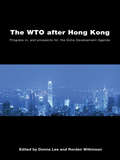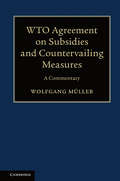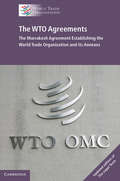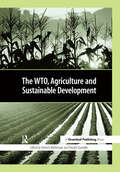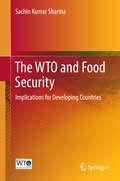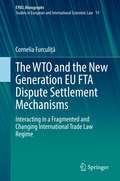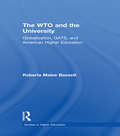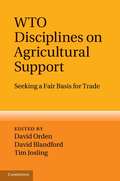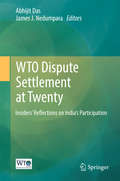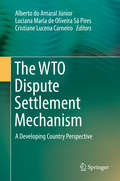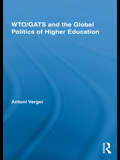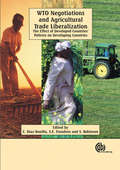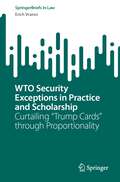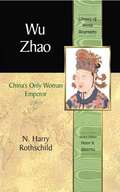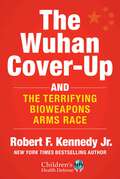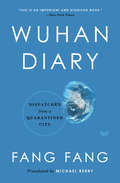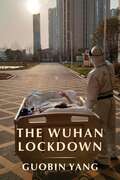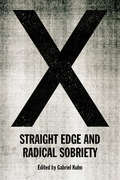- Table View
- List View
WTO Accessions and Trade Multilateralism
by Dadush, Uri and Osakwe, Chiedu Uri Dadush Chiedu OsakweWhat have WTO accessions contributed to the rules-based multilateral trading system? What demands have been made by original WTO members on acceding governments? How have the acceding governments fared? This volume of essays offers critical readings on how WTO accession negotiations have expanded the reach of the multilateral trading system not only geographically but also conceptually, clarifying disciplines and pointing the way to their further strengthening in future negotiations. Members who have acceded since the WTO was established now account for twenty per cent of total WTO membership. In the age of globalization there is an increased need for a universal system of trade rules. Accession negotiations have been used by governments as an instrument for domestic reforms, and one lesson from the accession process is that there are contexts which lead multilateral trade negotiations to successful outcomes even in the complex and multi-polar twenty-first century economic environment.
The WTO after Hong Kong: Progress in, and Prospects for, the Doha Development Agenda
by Rorden Wilkinson Donna LeeAfter the World Trade Organization’s (WTO) critical December 2005 Hong Kong ministerial meeting, negotiations to implement the Doha Development Agenda (DDA) broke down completely in the summer of 2006. This book offers a detailed and critical evaluation of how and why the negotiations arrived at this point and what the future holds for the WTO. It brings together leading scholars in the field of trade from across the social sciences who address the key issues at stake, the principal players in the negotiations, the role of fairness and legitimacy in the Doha Round, and the prospects for the DDA’s conclusion. The WTO after Hong Kong is the most comprehensive account of the current state of the World Trade Organization and will be of enormous interest to students of trade politics, international organizations, development and international political economy.
WTO Agreement on Subsidies and Countervailing Measures: A Commentary
by Wolfgang MüllerPanels and the WTO Appellate Body have rendered a large number of complex and lengthy rulings on the Agreement on Subsidies and Countervailing Measures. The reasoning behind these rulings is often intimately linked to the underlying facts of a particular case and the methods of litigation adopted by the parties. Without guidance, it is difficult to find and research a specific subsidy issue quickly. This book provides an essential article-by-article commentary on the Agreement and sets out the law as it emerges from this body of rulings, providing the legal basis for further analysis of subsidy disciplines within the realms of economics and political science. It also includes a useful summary of the negotiating history and the links to other WTO Agreements such as GATT 1994. This important reference work will appeal to international trade lawyers, government officials, researchers, students of international trade law, business associations and NGOs. Provides an article-by-article commentary of the Agreement in simple language, encouraging a fuller understanding of the Agreement's provisions. Includes an overview of the relevant jurisprudence so that the reader can locate specific areas of interest. Considers relevant scholarly writing, enabling the reader to gain a broader perspective beyond the Agreement itself.
The WTO Agreements: The Marrakesh Agreement Establishing the World Trade Organization and its Annexes
by World Trade OrganizationThis publication contains the text of the WTO's founding agreement, the 1994 Marrakesh Agreement Establishing the World Trade Organization, and its Annexes, including all amendments and additions since its entry into force until September 2017. <P><P>These include an amendment to the WTO's intellectual property agreement (TRIPS Agreement) aimed at improving developing countries' access to medicines, the WTO's Trade Facilitation Agreement, which entered into force in February 2017, an amendment adopted in July 2017 to extend the frequency of peer review periods under the Trade Policy Review Mechanism as of 2019, and the amended Government Procurement Agreement. <P>This publication updates and replaces The Legal Texts: The Results of the Uruguay Round of Multilateral Trade Negotiations, which was first printed in 1994. <P>Includes the complete and official texts of the WTO agreements in one collection.<P> Provides an indispensable guide to all WTO trade-related negotiations.<P> Updates and replaces The Legal Texts: The Results of the Uruguay Round of Multilateral Trade Negotiations (1994).
The WTO, Agriculture and Sustainable Development
by Heinrich Wohlmeyer Theodor QuendlerDespite the Doha declaration of November 2001, the failure to start a new round of global trade negotiations at Seattle in December 1999 and the hostility of protesters to the trade liberalization process and growing global economic and social disparities was a wake-up call for the World Trade Organisation (WTO). The ambitious goal of this ground-breaking book is to identify the strengths and weaknesses of liberalized world trade, in particular in the agricultural sector, and to investigate to what extent the current WTO agreements provide the necessary fail-safe devices to react to trade-related negative impacts on sustainability, environmental protection and food security. The background and interrelationship between the WTO, the tenets of sustainable development and the unique features of the agriculture and forestry sectors are explored, and conclusions regarding the deficits of the world trade system and its conflicts with basic societal goals – such as sustainability – are drawn. Agriculture and forestry have a particular affinity with what the authors call "strong sustainability" and are to be among the major agenda items in forthcoming WTO negotiations. The book proposes that sustainable agricultural production techniques such as integrated and organic farming provide a series of related services to community and environment which could be severely prejudiced by wholesale trade liberalization and the imposition of the large-scale production methods of the mega-trade giants of the USA and Europe. And yet the concept of sustainability is referred to only tangentially in the existing WTO agenda. The WTO, Agriculture and Sustainable Development argues that, without a formal recognition of this failing, the premise that free trade is inherently advantageous for all countries is a falsehood. Further, unfettered liberalization is unsustainable and a social and environmental multilateral framework must be agreed to reinterpret or adapt a host of WTO regulations that are at odds with sustainable development. The core problem is that, under the current system, import duties can only be differentiated by direct goods and services and not by their means of production – sustainable or otherwise. Therefore, a range of environmental policy measures in the agricultural sector, such as the consideration of product life-cycles, the internalization of external costs and a coupling of trade liberalization with ecological obligations are proposed by the authors. In addition, they argue that unsustainable economic short-termism must be curbed and the use of the stick of trade sanctions and the carrot of financial benefits for good environmental performance be permitted to promote sustainable agricultural practices. This book will contribute greatly in addressing the lack of basic theoretical arguments at the intersection between trade and sustainable development – a failing that has already been bemoaned by trade policy-makers. It is highly recommended reading for all those involved or interested in the WTO negotiations, whether from multilateral organizations, governments, industry or civil society.
WTO Analytical Index
by Legal Affairs Division World Trade OrganizationThe WTO Analytical Index is a comprehensive guide to the interpretation and application of the WTO Agreements by the Appellate Body, dispute settlement panels and other WTO bodies. It contains extracts of key pronouncements and findings from tens of thousands of pages of WTO jurisprudence, including panel reports, Appellate Body reports, Article 21.3(c) awards and Article 22.6 decisions. This unique work will be of assistance to anyone working in the field of WTO law, including lawyers, economists, academics and students. It is produced by the Legal Affairs Division of the WTO Secretariat with contributions from other divisions of the Secretariat and the Appellate Body Secretariat. The third edition of the WTO Analytical Index covers developments in WTO law and practice over the period January 1995 to September 2011.
The WTO and Food Security
by Sachin Kumar SharmaThis book examines the public stockholding policies of selected developing countries from the perspective of WTO rules and assesses whether the provisions of the Agreement on Agriculture (AoA) could hamper these countries' efforts to address the challenges of food security. Further, it highlights the need to amend the provisions of the AoA to make WTO rules just and fair for the millions of people suffering from hunger and malnutrition in developing countries. This book highlights that 12 countries namely China, Egypt, India, Indonesia, Jordan, Kenya, Morocco, Pakistan, Tunisia, Turkey, Zambia and Zimbabwe are facing or will face problems in implementing the food security policies due to the provisions under AoA. These provisions need to be amended for permitting developing countries to address hunger and undernourishment. Progress in WTO negotiations on public stockholding for food security purposes are also discussed and analysed. The findings of this study greatly benefit trade negotiators, policymakers, civil society, farmers groups, researchers, students and academics interested in issues related to the WTO, agriculture and food security.
The WTO and International Investment Law Converging Systems (Cambridge International Trade and Economic Law)
by Jürgen KurtzInternational law has historically regulated foreign trade and foreign investment differently. Distinct evolutionary pathways have led to variances in treaty form, institutional culture, and dispute settlement. With their inevitable erosion through the late twentieth to early twenty-first centuries, those weak boundaries have become porous and indefensible. Powerful economic, legal and sociological factors are now pushing the two systems together. In this book, Jürgen Kurtz systematically explores the often complex and little-understood dynamics of this convergence phenomenon. Kurtz addresses the growing connections between international trade and investment law, proposing a theoretically grounded and doctrinally tractable framework to understand the deepening relationship between them. The book also offers reform ideas and possibilities, providing treaty negotiators and other government officials with a set of theoretical insights and doctrinal models that can guide actors in building a justifiable and sustainable level of commonality between the two legal systems. Proposes a new understanding of the relationship between international trade and investment law Offers theoretical justifications for levels of convergence between the two regimes and expands the potential readership base beyond law to other disciplinary areas Identifies vectors by which both legal regimes may achieve systemic maturation and will appeal to treaty negotiators and policy makers who are seeking to reform both systems
The WTO and the New Generation EU FTA Dispute Settlement Mechanisms: Interacting in a Fragmented and Changing International Trade Law Regime (European Yearbook of International Economic Law #19)
by Cornelia FurculițăThis book explores interactions between the new generation EU FTA and the WTO dispute settlement mechanisms, adopting an innovative, comprehensive approach. It investigates how the mechanisms potentially could and actually do compete, conflict, and cooperate, focusing not only on the potential negative consequences of fragmentation, but also on how synergies could be enhanced. Thus, unlike the existing literature, which chiefly focuses on conflicting interactions, it considers positive and negative interactions alike. Moreover, the book explores the topic in light of the most recent changes in and challenges to the international trade law regime. Particular attention is paid to how the multilateral and bilateral mechanisms studied interact with regard to the current WTO dispute settlement crisis and the EU-backed multi-party interim appeal arbitration arrangement. Thus, the book provides up-to-date answers to compelling questions. It also examines in detail the new generation EU FTA dispute settlement mechanisms, an aspect which has not been the subject of thorough research to date.The book pursues an interdisciplinary approach, combining legal methodology, international relations and political science theories with interviews. Given its scope, the book will appeal to researchers and scholars whose work involves international trade law issues. However, it will also be of interest to general international law academics, as it touches upon such issues as fragmentation, forum shopping, and general rules of interpretation. Furthermore, by analysing and presenting proposals with regard to the new generation EU FTAs, it will also be pertinent to the work of EU policymakers and researchers studying EU trade law.
The WTO and the University: Globalization, GATS, and American Higher Education (Studies in Higher Education)
by Roberta Malee BassettBy and large, the debate about the merits of including higher education services within free trade policies has occurred outside of the United States, even though the U.S. Office of the Trade Representative has specifically included higher education services in its March 2003 negotiating offer to the General Agreement on Trade in Services (GATS). This book emerged from research and conversations on the potential implications of free trade on American higher education, implications which have yet to lead to any real conversation or debate within the broad higher education community in the United States. It fills a niche in the literature on trade and higher education services by providing context and analysis of the trade issue in the American higher education context, as well as the pros and cons of free trade in higher education services from the perspectives of the U.S.-based actors.
WTO Disciplines on Agricultural Support
by David Blandford David Orden Tim JoslingFarm support is contentious in international negotiations. This in-depth assessment of the legal compliance and economic evaluation issues raised by the WTO Agreement on Agriculture presents consistent support data and forward-looking projections for eight developed and developing countries (EU, US, Japan, Norway, Brazil, China, India, Philippines), using original estimates where official notifications are not available. Variations over time in notified support in some cases reflect real policy changes; others merely reflect shifts in how countries represent their measures. The stalled Doha negotiations presage significantly tighter constraints for developed countries that provide the highest support, but loopholes will persist. Developing countries face fewer constraints and their trade-distorting farm support can rise. Pressure points and key remaining issues if a Doha agreement is reached are evaluated. Vigilant monitoring for compliance of farm support with WTO commitments will be required to lessen its negative consequences whether or not the Doha Round is concluded.
WTO Disciplines on Subsidies and Countervailing Measures
by Dominic CoppensDoes the WTO leave appropriate policy space to its Members to pursue legitimate objectives, such as the economic development of developing countries, the conversion to a greener economy, or recovery in times of a global economic downturn? This legal and normative analysis of the WTO rules on subsidies and countervailing measures sheds light on why governments resort to subsidization and, by tracing the historical origins of the SCM Agreement and the Agreement on Agriculture, on why they have been willing to gradually confine their policy space. This sets the stage for a systematic and comprehensive legal analysis of both agreements, which integrates the vast amount of case law and proposals tabled in the Doha round. A separate case study explores the complex rules on export credit support, and the book closes with an in-depth normative assessment of these WTO rules on subsidies and countervailing measures.
WTO Dispute Settlement at Twenty
by Abhijit Das James J. NedumparaThis book focuses on India's participation in the WTO dispute settlement system, at a time when India has emerged as one of the most successful and prominent users of WTO dispute settlement among the developing countries. It offers a unique collection of perspectives from insiders - legal practitioners, policymakers, industry representatives and academics - on India's participation in the system since its creation in 1995. Presenting in-depth analyses of substantive issues, the book shares rare insights into the jurisprudential significance, political economy contexts and capacity-building challenges faced by India. It closely examines India's approach in effectively participating in the WTO's dispute settlement mechanism including the framing of litigation strategies, developing legal and stakeholder infrastructure, implementing dispute settlement decisions, and the impacts of the findings of the WTO panels / Appellate Body on domestic policymaking and India's long-term trade interests. In addition to discussing the key "classic" jurisprudential issues, the book also explores domestic regulatory and policy issues, complemented by selected case studies.
The WTO Dispute Settlement Mechanism: A Developing Country Perspective
by Alberto do Amaral Júnior Luciana Maria de Oliveira Sá Pires Cristiane Lucena CarneiroThis book offers a multidisciplinary approach to the Dispute Settlement Mechanism (DSM) by bringing together contributions from legal scholars and political scientists. Most of the authors belong to a tightly knit legal epistemic community, trained at the University of São Paulo and at the top-ranked research and policy centers on WTO law in Europe.Presenting a novel and unique perspective on the DSM, it provides an analysis of current themes at the heart of the WTO Dispute Settlement Mechanism through the lenses of scholars with a “developing country” perspective.Focusing on assessment, substance, and process, it presents a three-fold approach to the analysis and offers a singular contribution to the scholarly literature on the WTO. The book discusses the topic from the viewpoint of individuals deeply involved in the scholarly production as well as the daily operation of the mechanism. The contributors include academics in the fields of international economic law and political science, diplomats, individuals engaged in legal private practice, and individuals affiliated with the WTO as well as WTO-related think tanks. The result is a balanced perspective on pressing issues that have arisen and that are likely to remain at the center of the scholarly and policy debate for years to come.
WTO Domestic Regulation and Services Trade
by Aik Hoe Lim Bart De MeesterDomestic regulation of services sectors has a significant impact on services trade liberalization, which is why General Agreement on Trade in Services (GATS) disciplines are negotiated in the WTO. With the help of analyses and case-studies from academics, regulators and trade experts, this book explores the scope and limits of WTO legal principles to promote domestic regulatory reform. Case-studies discuss country-specific challenges and experiences of regulating important service sectors, such as finance, telecommunications, distribution, legal, education, health, postal and logistics services, as well as the role of regulatory impact assessments. The findings will interest trade officials, policy-makers, regulators, think tanks and businesses concerned with the implications of domestic regulation on access to services markets, and with the opportunities for formulating trade disciplines in this area. It is also a useful resource for academics and students researching regulatory approaches and practices in services sectors.
WTO/GATS and the Global Politics of Higher Education (Studies in Higher Education)
by Antoni VergerSince the General Agreement on Trade in Services (GATS) was created in 1995, there has been international pressure towards the liberalization of education all over the world, as well as new challenges to the traditional internationalization rationale in the field of higher education. Nevertheless, education liberalization under the GATS is also a contested process. Public universities, teachers unions, development NGOs and other education stakeholders have opposed and campaigned against the GATS in different countries and at a range of levels from local to global. Based on intensive fieldwork in the WTO headquarters and on two case studies (Argentina and Chile), Antoni Verger opens the black-box of the GATS negotiations in the field of education. His well-documented work explores in-depth how domestic actors and interests are key to understanding the constitution of the global education liberalization process entailed by the GATS as well as the opposition to this process in certain places. This book is crucial reading to anyone with an interest in the future of higher education.
WTO Negotiations and Agricultural Trade Liberalization: The Effect of Developed Countries' Policies on Developing Countries
by E. Diaz-Bonilla S. Robinson S. E. FrandsenThe purpose of this book is to analyze the effects of developed countries' agricultural policies on developing countries. The main focus is on food security, poverty and other topics such as multifunctionality, biotechnology and regional agreements, as an input to policy reform within the World Trade Organization (WTO) trade negotiations. The book arises from a joint project between the Food and Resource Economics Institute in Denmark and the International Food Policy Research Institute in Washington.
The WTO Regime on Government Procurement: Challenge and Reform
by Sue Arrowsmith Robert D. AndersonOriginally an important but relatively obscure plurilateral instrument, the WTO Agreement on Government Procurement (GPA) is now becoming a pillar of the WTO system as a result of important developments since the Uruguay Round. This collection examines the issues and challenges that this raises for the GPA, as well as future prospects for addressing government procurement at a multilateral level. Coverage includes issues relating to pending accessions to the GPA, particularly those of developing countries with a large state sector such as China; the revised (provisionally agreed) GPA text of 2006, including provisions on electronic procurement and Special and Differential Treatment for Developing Countries; and procurement provisions in regional trade agreements and their significance for the multilateral system. Attention is also given to emerging issues, especially those concerning environmental, social and SME policy; competition law; and the implications of the recent economic crisis.
WTO Security Exceptions in Practice and Scholarship: Curtailing “Trump Cards” through Proportionality (SpringerBriefs in Law)
by Erich VranesThis book offers an in-depth analysis of the WTO security exceptions and relevant rulings by WTO dispute settlement panels. The WTO security exceptions are commonly regarded as the "box of Pandora" of the WTO system, since WTO Member States can invoke them in order to justify trade restrictions violating WTO law which they consider necessary for their essential security interests. The Members of the WTO and the GATT 1947 have hesitated for decades to rely on these security exceptions. In recent years, however, these clauses have been invoked for the first time in high-profile disputes involving Russia and Ukraine, Saudi Arabia and Qatar, as well as the US, China, the EU and other nations. This has been regarded as the turn of an era in view of the risk that the security exceptions could be instrumentalized to undermine the WTO and the international economic governance system more generally. This study therefore thoroughly analyses the WTO panel reports issued in these landmark cases. It also explains the geopolitical relevance of the increasing invocation of security clauses and argues that the legally and methodologically sound application of the WTO security exceptions, which have often been regarded as “self-judging” provisions, requires a proportionality analysis encompassing tests of the suitability and necessity of the trade measures to be justified under these truly exceptional clauses.
Wu Zhao: China's Only Female Emperor
by N. RothschildThis new entry in the Longman Library of World Biography series offers the compelling story of Wu Zhao - one woman’s unlikely and remarkable ascent to the apex of political power in the patriarchal society of traditional China. Wu Zhao, Woman Emperor of China is the account of the first and only female emperor in China’s history. Set in vibrant, multi-ethnic Tang China, this biography chronicles Wu Zhao’s humble beginnings as the daughter of a provincial official, following her path to the inner palace, where she improbably rose from a fifth-ranked concubine to becoming Empress. Using clever Buddhist rhetoric, grandiose architecture, elegant court rituals, and an insidious network of “cruel officials” to cow her many opponents in court, Wu Zhao inaugurated a new dynasty in 690, the Zhou. She ruled as Emperor for fifteen years, proving eminently competent in the arts of governance, deftly balancing factions in court, staving off the encroachment of Turks and Tibetans, and fostering the state’s economic growth.
The Wuhan Cover-Up: And the Terrifying Bioweapons Arms Race (Children’s Health Defense)
by Robert F. Kennedy Jr.&“RFK Jr. exposes the decades of lies.&”—Luc Montagnier, Nobel laureate From the New York Times, Wall Street Journal, USA Today, and Publishers Weekly bestselling author of The Real Anthony Fauci comes an explosive exposé of the cover-up behind the true origins of COVID-19. &“Gain-of-function&” experiments are often conducted to deliberately develop highly virulent, easily transmissible pathogens for the stated purpose of developing preemptive vaccines for animal viruses before they jump to humans. More insidious is the &“dual use&” nature of this research, specifically directed toward bioweapons development. The Wuhan Cover-Up pulls back the curtain on how the US government's increase in biosecurity spending after the 2001 terror attacks set in motion a plan to transform the National Institute of Allergy and Infectious Diseases (NIAID), under the direction of Dr. Anthony Fauci, into a de facto Defense Department agency. While Dr. Fauci zealously funded and pursued gain-of-function research, concern grew among some scientists and government officials about the potential for accidental or deliberate release of weaponized viruses from labs that might trigger worldwide pandemics. A moratorium was placed on this research, but true to form, Dr. Fauci found ways to continue unperturbed—outsourcing some of the most controversial experiments offshore to China and providing federal funding to Wuhan Institute of Virology's (WIV's) leading researchers for gain-of-function studies in partnership with the Chinese military and the Chinese Communist Party. Robert F. Kennedy Jr.'s meticulously researched and rigorously sourced analysis leads readers on a staggering journey to learn about: the key enablers and henchmen pushing for gain-of-function research the economic motives behind gain-of-function research successfully engineered &“chimeric viruses&” that can infect and kill humans the coordinated effort to silence speculation of COVID-19&’s laboratory genesis the complicity of scientific journals to hide the origins of COVID-19 the role of the Wuhan Institute of Virology in China&’s biowarfare/biodefense program the relationships between US health, military, and intelligence bureaucracies and scientists and their Chinese counterparts the roles of Bill Gates and Sir Jeremy Farrar in orchestrating a global cover-up The Wuhan Cover-Up unveils a global conspiracy of epic proportion and lethal consequence.
Wuhan Diary: Dispatches from a Quarantined City
by Fang FangFrom one of China’s most acclaimed and decorated writers comes a powerful first-person account of life in Wuhan during the COVID-19 outbreak.On January 25, 2020, after the central government imposed a lockdown in Wuhan, acclaimed Chinese writer Fang Fang began publishing an online diary. In the days and weeks that followed, Fang Fang’s nightly postings gave voice to the fears, frustrations, anger, and hope of millions of her fellow citizens, reflecting on the psychological impact of forced isolation, the role of the internet as both community lifeline and source of misinformation, and most tragically, the lives of neighbors and friends taken by the deadly virus. A fascinating eyewitness account of events as they unfold, Wuhan Diary captures the challenges of daily life and the changing moods and emotions of being quarantined without reliable information. Fang Fang finds solace in small domestic comforts and is inspired by the courage of friends, health professionals and volunteers, as well as the resilience and perseverance of Wuhan’s nine million residents. But, by claiming the writer´s duty to record she also speaks out against social injustice, abuse of power, and other problems which impeded the response to the epidemic and gets herself embroiled in online controversies because of it.As Fang Fang documents the beginning of the global health crisis in real time, we are able to identify patterns and mistakes that many of the countries dealing with the novel coronavirus have later repeated. She reminds us that, in the face of the new virus, the plight of the citizens of Wuhan is also that of citizens everywhere. As Fang Fang writes: “The virus is the common enemy of humankind; that is a lesson for all humanity. The only way we can conquer this virus and free ourselves from its grip is for all members of humankind to work together.” Blending the intimate and the epic, the profound and the quotidian, Wuhan Diary is a remarkable record of an extraordinary time. Translated from the Chinese by Michael Berry
The Wuhan Lockdown
by Guobin YangA metropolis with a population of about 11 million, Wuhan sits at the crossroads of China. It was here that in the last days of 2019, the first reports of a mysterious new form of pneumonia emerged. Before long, an abrupt and unprecedented lockdown was declared—the first of many such responses to the spread of the COVID-19 pandemic around the world.This book tells the dramatic story of the Wuhan lockdown in the voices of the city’s own people. Using a vast archive of more than 6,000 diaries, the sociologist Guobin Yang vividly depicts how the city coped during the crisis. He analyzes how the state managed—or mismanaged—the lockdown and explores how Wuhan’s residents responded by taking on increasingly active roles. Yang demonstrates that citizen engagement—whether public action or the civic inaction of staying at home—was essential in the effort to fight the pandemic. The book features compelling stories of citizens and civic groups in their struggle against COVID-19: physicians, patients, volunteers, government officials, feminist organizers, social media commentators, and even aunties loudly swearing at party officials. These snapshots from the lockdown capture China at a critical moment, revealing the intricacies of politics, citizenship, morality, community, and digital technology. Presenting the extraordinary experiences of ordinary people, The Wuhan Lockdown is an unparalleled account of the first moments of the crisis that would define the age.
WWII Biographies: Hitler and the Third Reich
by Catherine BradleyThe life of the German chancellor, focusing on his rise to power, the buildup of the German Wehrmacht, and his death in 1945 in a Berlin bunker.
X: Straight Edge and Radical Sobriety
by Gabriel KuhnStraight edge—hardcore punk's drug-free offshoot—has thrived as a subculture since the early 1980s. Its influence has reached far beyond musical genres and subcultural divides. Today it is more diverse and richly complex than ever, and in the past decade alcohol and drug use have become a much-discussed issue in radical politics, not least due to the hard work, dedication, and commitment to social and environmental justice found among straight-edge activists.X: Straight Edge and Radical Sobriety is Gabriel Kuhn's highly anticipated follow-up to his critically acclaimed Sober Living for the Revolution. In this impressive volume, Kuhn continues his reconnaissance of straight edge culture and how it overlaps with radical politics. Extensively illustrated and combining original interviews and essays with manifestos and reprints from zines and pamphlets, X is a vital portrait of the wide spectrum of people who define straight edge culture today. In the sprawling scope of this book, the notion of straight edge as a bastion of white, middle-class, cis males is confronted and challenged. X takes a piercing look at religion, identity, feminism, aesthetics, harm reduction, and much more. It is both a call to action and an elaborate redefinition of straight edge and radical sobriety. Promising to inspire discussion, reflection, and unearth hidden chapters of hardcore punk history, X is of crucial importance to anybody interested in the politics of punk and social constructive thought.

